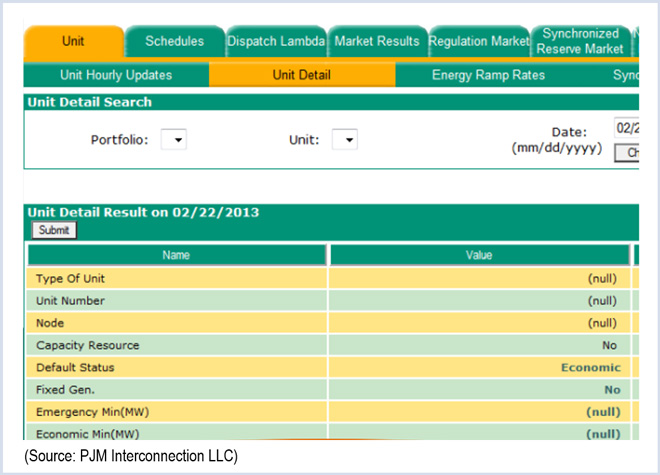VALLEY FORGE, Pa. — Software problems have led PJM to delay implementation of an eMKT tool allowing gas-fired generators to make intraday changes in price schedules, Chantal Hendrzak, PJM general manager of Applied Solutions, told the Operating Committee last week.
The optional system, called the Intraday Cost Schedule Update, had been set to go live Feb. 9. It is now expected to go into production Feb. 23. The changes, intended to more accurately reflect the cost of generation, will allow users to file a different cost schedule for each hour every day, not just during cold weather alerts.

Once the update is functional, the previous manual process will no longer be supported.
Additionally, fuel data enhancements in eMKT were scheduled to be introduced to the eMKT “sandbox” for testing Feb. 13. Beginning April 1, all members will be required to supply energy fuel type and subtype, as well as startup fuel type and subtype, in order for their offers to be accepted — regardless of whether the generator plans to make intraday price changes.
January Operations Show Improvement
A report on last month’s operations showed that the forced outage rate was much lower than in January 2014, with outages peaking at 10% during an RTO-wide cold weather alert Jan. 7-8.
Gas problems were responsible for about half of the 18,861 MW that failed to operate during the morning peak on Jan. 8 and the 13,481 that faltered on the evening of Jan. 7.
The preliminary reported load for Jan. 8 was 136,669 MW, the fifth-highest winter peak on record. Jan. 7 saw the seventh-highest peak at 136,119 MW.
No units changed their costs intraday during the cold weather alert.
Wind generation during the cold weather event also was good, at 2,500 to 5,300 MW during peak hours.
Cold Weather Preparation Test Fails 10 Generators
PJM tested 168 generators in December and January, and all but 10 were successful.
In all, 443 units were eligible to participate in the exercise. Of those that did, 26 experienced initial failures. In a retest, 16 succeeded.
The largest cause of failure, at 31%, was liquid fuel handling problems, followed by cranking diesel failure and circuit breaker issues, each accounting for 15% of the total. Control system problems made up 12%. The remaining 27% of failures were chalked up to miscellaneous reasons, such as generator instrumentation issues and excessive vibration.
The participating units experienced a significantly lower percentage of forced outages in the first week of January compared with units that either declined or were not eligible to take part.
The cost of the winter testing came to $4.88 million.
Sought: Ways to Incent Training, Certification Compliance
Some PJM generation operators are guilty of “chronic non-compliance” with training and certification requirements, PJM told members.
While non-compliant companies are supposed to submit mitigation plans, many have not, and there are no financial penalties for failing to do so.
PJM officials asked the Operating Committee to consider whether the RTO should impose financial penalties or deny offenders access to PJM markets and tools.
Transmission operators generally are in compliance, officials said.
System Restoration Coordinators Task Force Becomes Subcommittee
Members approved a charter change upgrading system restoration coordinators from a task force to a subcommittee.
The change was made because task forces are supposed to sunset. The subcommittee will report to the Operating Committee.
Suzanne Herel


